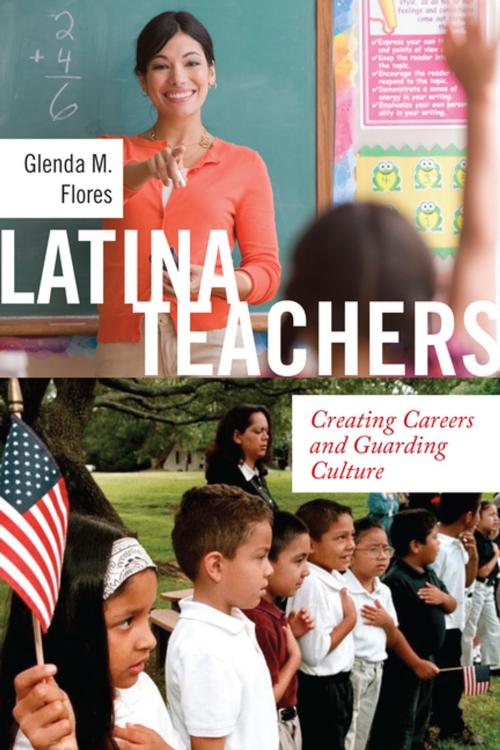Latina Teachers
Creating Careers and Guarding Culture
Nonfiction, Social & Cultural Studies, Social Science, Cultural Studies, Ethnic Studies, Sociology| Author: | Glenda M. Flores | ISBN: | 9781479886210 |
| Publisher: | NYU Press | Publication: | June 13, 2017 |
| Imprint: | NYU Press | Language: | English |
| Author: | Glenda M. Flores |
| ISBN: | 9781479886210 |
| Publisher: | NYU Press |
| Publication: | June 13, 2017 |
| Imprint: | NYU Press |
| Language: | English |
Winner, 2018 Outstanding Contribution to Scholarship Book Award presented by the American Sociological Association's Section on Race, Class, and Gender
Honorable Mention, 2018 Distinguished Contribution to Research Book Award presented by the American Sociological Association's Latina/o Sociology Section
How Latina teachers are making careers and helping students stay in touch with their roots.
Latina women make up the fastest growing non-white group entering the teaching profession at a time when it is estimated that 20% of all students nationwide now identify as Latina/o. Through ethnographic and participant observation in two underperforming majority-minority schools in Los Angeles, as well as interviews with teachers, parents and staff, Latina Teachers examines the complexities stemming from a growing workforce of Latina teachers.
The teachers profiled use Latino cultural resources and serve as agents of ethnic mobility. They actively teach their students how to navigate American race and class structures while retaining their cultural roots, necessary tactics in an American education system that has not fully caught up with the nation’s demographic changes. Flores also explores the challenges faced by Latina teachers, including language barriers and cultural acclimation, and professional inequalities that continue to affect women of color at work.
An unprecedented look at an understudied population, Latina Teachers presents an important picture of the women who are increasingly shaping the way America’s children are educated.
Winner, 2018 Outstanding Contribution to Scholarship Book Award presented by the American Sociological Association's Section on Race, Class, and Gender
Honorable Mention, 2018 Distinguished Contribution to Research Book Award presented by the American Sociological Association's Latina/o Sociology Section
How Latina teachers are making careers and helping students stay in touch with their roots.
Latina women make up the fastest growing non-white group entering the teaching profession at a time when it is estimated that 20% of all students nationwide now identify as Latina/o. Through ethnographic and participant observation in two underperforming majority-minority schools in Los Angeles, as well as interviews with teachers, parents and staff, Latina Teachers examines the complexities stemming from a growing workforce of Latina teachers.
The teachers profiled use Latino cultural resources and serve as agents of ethnic mobility. They actively teach their students how to navigate American race and class structures while retaining their cultural roots, necessary tactics in an American education system that has not fully caught up with the nation’s demographic changes. Flores also explores the challenges faced by Latina teachers, including language barriers and cultural acclimation, and professional inequalities that continue to affect women of color at work.
An unprecedented look at an understudied population, Latina Teachers presents an important picture of the women who are increasingly shaping the way America’s children are educated.
Winner, 2018 Outstanding Contribution to Scholarship Book Award presented by the American Sociological Association's Section on Race, Class, and Gender
Honorable Mention, 2018 Distinguished Contribution to Research Book Award presented by the American Sociological Association's Latina/o Sociology Section
How Latina teachers are making careers and helping students stay in touch with their roots.
Latina women make up the fastest growing non-white group entering the teaching profession at a time when it is estimated that 20% of all students nationwide now identify as Latina/o. Through ethnographic and participant observation in two underperforming majority-minority schools in Los Angeles, as well as interviews with teachers, parents and staff, Latina Teachers examines the complexities stemming from a growing workforce of Latina teachers.
The teachers profiled use Latino cultural resources and serve as agents of ethnic mobility. They actively teach their students how to navigate American race and class structures while retaining their cultural roots, necessary tactics in an American education system that has not fully caught up with the nation’s demographic changes. Flores also explores the challenges faced by Latina teachers, including language barriers and cultural acclimation, and professional inequalities that continue to affect women of color at work.
An unprecedented look at an understudied population, Latina Teachers presents an important picture of the women who are increasingly shaping the way America’s children are educated.
Winner, 2018 Outstanding Contribution to Scholarship Book Award presented by the American Sociological Association's Section on Race, Class, and Gender
Honorable Mention, 2018 Distinguished Contribution to Research Book Award presented by the American Sociological Association's Latina/o Sociology Section
How Latina teachers are making careers and helping students stay in touch with their roots.
Latina women make up the fastest growing non-white group entering the teaching profession at a time when it is estimated that 20% of all students nationwide now identify as Latina/o. Through ethnographic and participant observation in two underperforming majority-minority schools in Los Angeles, as well as interviews with teachers, parents and staff, Latina Teachers examines the complexities stemming from a growing workforce of Latina teachers.
The teachers profiled use Latino cultural resources and serve as agents of ethnic mobility. They actively teach their students how to navigate American race and class structures while retaining their cultural roots, necessary tactics in an American education system that has not fully caught up with the nation’s demographic changes. Flores also explores the challenges faced by Latina teachers, including language barriers and cultural acclimation, and professional inequalities that continue to affect women of color at work.
An unprecedented look at an understudied population, Latina Teachers presents an important picture of the women who are increasingly shaping the way America’s children are educated.















